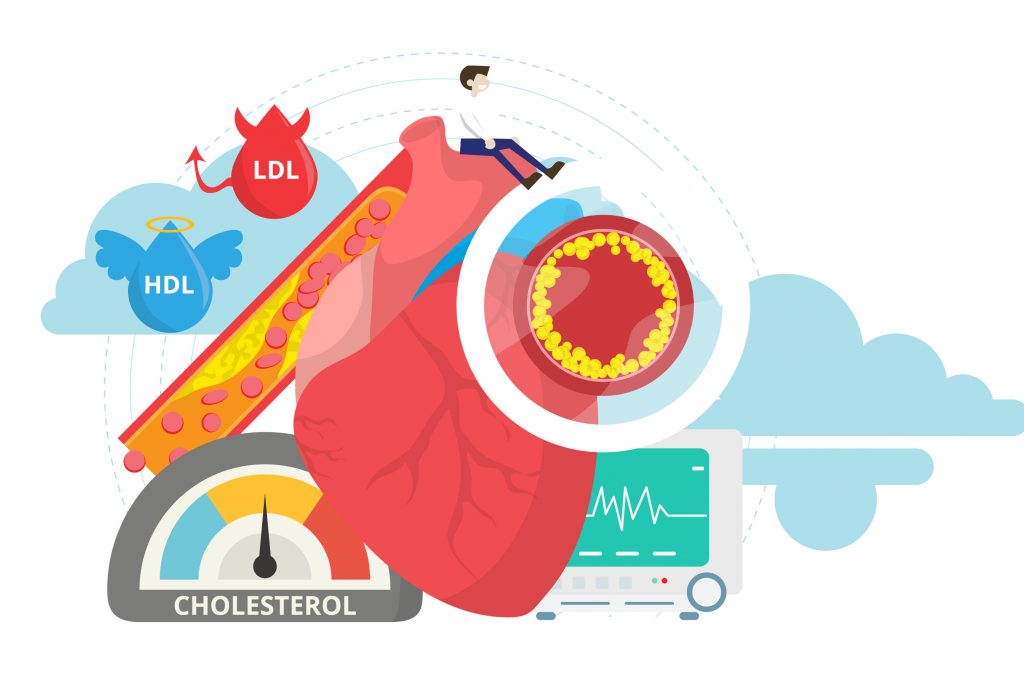September is National Cholesterol Education month. According to the Centers for Disease Control and Prevention, almost 93 million U.S. adults have high cholesterol, so it’s a subject there’s no better time to learn about.
What is cholesterol?
It is a waxy substance found in your cells, used to make hormones and digest fats. Your body makes the cholesterol it needs, but also acquires it from certain foods, like egg yolks or fatty meats. High cholesterol can cause plaque buildup in your arteries, leading to an increased risk of heart disease and stroke.
What does “good” and “bad” cholesterol mean?
There are two types of lipoproteins responsible for carrying cholesterol to and from cells: low-density (LDL) and high-density (HDL).
- LDL: It makes up most of the cholesterol in your body. LDL is considered “bad” because it contributes to fatty buildup in arteries.
- HDL: It carries cholesterol away from the arteries to the liver, where it is broken down and flushed from the body. “Good” cholesterol doesn’t completely remove LDL, only one-third to one-fourth of total blood cholesterol.
When should you start checking your cholesterol levels?
High cholesterol has no signs or symptoms, so the only way to know if it’s an issue for you is through screening. The CDC recommends adults at low risk for heart disease have their cholesterol tested every five years, and those at higher risk should consult their doctor about how often they should be screened. Risk factors for high cholesterol include family history, diabetes and age. Men tend to have higher bad and lower good cholesterol, and for post-menopausal women, LDL cholesterol increases.
Can your cholesterol be too low?
In rare cases, a very low level of LDL or total cholesterol has been associated with health problems, but doctors still are studying the link between low cholesterol and health risks. It has not been determined if low cholesterol levels cause health issues or vice versa. Very low levels may be associated with increased risk of cancer, hemorrhagic stroke, depression and anxiety, as well as preterm birth for pregnant women.
Which foods affect your cholesterol?
Saturated fats like red meat and full-fat dairy raise your total cholesterol, and limiting your intake of these foods can reduce your bad cholesterol. The same is true of trans fats, which often appears on food labels as “partially hydrogenated vegetable oil.” The Food and Drug Administration banned the use of trans fats in 2018, but food produced before that date was allowed to be distributed as recently as this January.
There also are several foods you can incorporate into your diet to improve your heart health and cholesterol.
- Foods rich in omega-3 fatty acids like salmon, mackerel, walnuts and flaxseeds
- Oatmeal, kidney beans, Brussels sprouts, apples, pears and other foods with soluble fiber, which can reduce absorption of cholesterol into your bloodstream
- Low-fat dairy products because whey protein has been shown to lower LDL and total cholesterol as well as blood pressure.
Other than diet, how can you improve your cholesterol level?
There are several lifestyle changes that can help improve your cholesterol level.
- Exercise: Moderate physical activity can help raise good cholesterol. Exercise for 30 minutes five times a week or, if you work out more vigorously, 20 minutes three times a week.
- Quitting Smoking: Improves your HDL cholesterol, and within a year of quitting, your risk of heart disease is cut in half.
- Moderate Alcohol Intake: While the benefits aren’t significant enough to recommend alcohol to nondrinkers, moderate alcohol consumption has been linked to higher levels of good cholesterol. That means up to one drink a day for women of all ages and men older than 65, and up to two drinks a day for men 65 and younger. However, too much alcohol can lead to serious health problems, including high blood pressure, heart failure and stroke.
- Weight Loss: Extra pounds can contribute to high cholesterol. Tracking calories and watching fat intake, along with incorporating more activity into your daily routine, are beneficial ways to lower cholesterol while also helping with weight loss.
Sources: Sources: Mayo Clinic, CDC, American Heart Association
